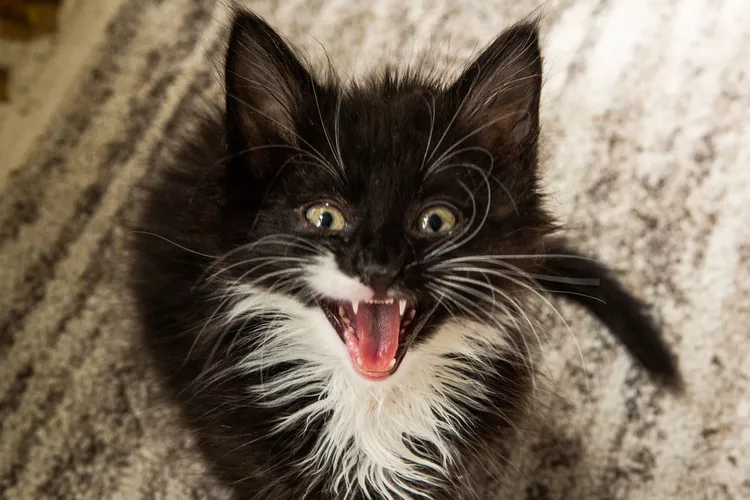What You Should Know About Kitten Teeth and Dental Care

Caring for a new kitten can be exciting, but it is also a huge responsibility. Most people know they must take care of the basics like food, water, and housing, but there are so many other things to consider. So before a decision is made to bring home a kitten, make sure you know what is needed to provide them with the best chance of living a healthy and happy life.
Routine health visits, vaccinations, parasite screening and prevention, and spaying and neutering, are all vital to a pet's overall health. But did you know your kitten's dental health is just as important? More than half of cats over the age of three suffer from dental disease. Cats have some of the same dental issues as dogs, yet feline dental care is probably the most over-looked and undertreated. This article will focus on kitten dental care, including the normal make up of the kitten's oral cavity, a common dental condition and how it is treated, and how owners can take care of their kitten's teeth at home.
Kitten Teeth and Teething
Cats, like humans, have two sets of teeth in their lifetime. Their kitten teeth also referred to as primary, milk, or deciduous teeth, and then their permanent, or adult teeth. Kittens are born without visible teeth. Around three weeks of age, their kitten teeth will begin to erupt. By four months of age, all of their 26 primary teeth, should be visible. By the time a kitten reaches six to seven months, all of their 30 permanent teeth should have erupted.
Before adult teeth erupt through the gums, they start to develop from tooth buds located in the upper and lower jaws. As the adult teeth develop they will start pressing against the roots of the baby teeth, and then things get a little complicated. The teething process usually begins around 11 to 12 weeks of age. During this time kittens may experience drooling, difficulty eating, and may be slightly irritable. Most kittens will have an urge to chew on things, usually the wrong thing! A characteristic breath odor may also be noted. This odor is normal and should subside once the teething process is over.
Retained Deciduous Teeth
By the time a kitten is about six to seven months old, the adult teeth should be in. Sometimes, the kitten teeth fail to fall out and it continues to occupy space where only the adult teeth should be. When deciduous (kitten) teeth don’t fall out to make way for the permanent teeth, they are called retained deciduous teeth. Retained deciduous teeth should be surgically extracted once they are discovered to avoid dental problems.
When deciduous and permanent teeth are trying to occupy the same space, this double row of teeth overcrowds the mouth, and food gets trapped between the teeth. Trapped food can cause periodontal disease, an infection of the tissue that holds the teeth in place. In addition, the double sets of teeth mean there will be double sets of roots. This will prevent normal development of the tooth’s socket and will eventually erode gum support around the adult tooth. Surgical removal of retained deciduous teeth gives adult teeth the space needed to develop properly.
Home Dental Care and Prevention
Toothpaste and Brushing
If you start brushing your kitten's teeth at an early age, they may be more accepting of it when they are older and their adult teeth come in. Make sure to use a toothbrush and paste that is approved for cats. Do not use human toothpaste. Toothpaste comes in a variety of flavors for cats, including chicken and tuna. Find one that your kitten likes and try to brush their teeth at least three times a week, more if they will let you!
Dental Wipes, Rinses, and Pads
When kittens get a little older, they may not tolerate brushing. Some animals, especially those with tender gums, will not tolerate brushing but are more amenable to disinfecting wipes or pads. Dental wipes, rinses, and pads will wipe off plaque deposits from the surface of the tooth and. They aren't helpful in removing food particles out of the gum socket, but they are probably the next best thing to brushing. These products are best used daily.
Dental Treats
Treats are not a replacement for brushing, however, kittens that have their adult teeth may benefit from chewing on a proper dental chew daily. They can substantially reduce plaque and tartar by up to 69 percent. Greenies are a great option for kittens and cats. To avoid weight gain, make sure to feed only the recommended amount of treats.
The goal of starting home dental care early on with your kitten is to prevent periodontal disease when they are older. A professional cleaning by your veterinarian may be necessary sometime during their life, but incorporating a dental care routine for your kitten in your daily schedule may reduce the number of cleanings needed in the future.
References
- Lundgren, DVM, Becky. "Retained Baby Teeth Need Surgical Extraction - Veterinary Partner - VIN". Veterinarypartner.Vin.Com, 2013, https://veterinarypartner.vin.com/default.aspx?pid=19239&id=4952450.
- "Smith Jr., DVM, DiplACVIM, Francis W. K. and Tilley, DVM, DiplACVIM, Larry P. et al". Blackwell's Five-Minute Veterinary Consult: Canine and Feline 5th Edition. John Wiley and Sons, Inc. 2011. West Sussex, UK. Kindle file